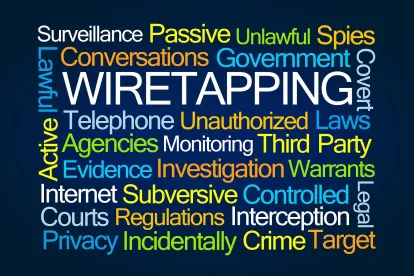The Massachusetts wiretap statute, Massachusetts General Laws chapter 272, section 99, provides that “any person who–willfully commits an interception, attempts to commit an interception, or procures any other person to commit an interception or to attempt to commit an interception of any wire or oral communication shall be fined not more than ten thousand dollars, or imprisoned in the state prison for not more than five years, or imprisoned in a jail or house of correction for not more than two and one half years, or both so fined and given one such imprisonment.”
An “interception” means to secretly hear, secretly record, or aid another to secretly hear or secretly record the contents of any wire or oral communication through the use of any intercepting device by any person other than a person given prior authority by all parties to such communication.
There is a private right of action under the Massachusetts wiretap statute and provides for damages including:
- actual damages but not less than liquidated damages computed at the rate of $100 per day for each day of violation or $1000, whichever is higher;
- punitive damages; and
- a reasonable attorney’s fee and other litigation disbursements reasonably incurred. Good faith reliance on a warrant issued under this section shall constitute a complete defense to an action brought under this paragraph.
The Massachusetts’ right of privacy statute, Mass.Gen.L. ch. 214, § 1B, provides that “A person shall have a right against unreasonable, substantial or serious interference with his privacy.” To constitute an invasion of privacy, the invasion must be both unreasonable and serious or substantial.
But unfortunately, this case doesn’t delve into the Massachusetts wiretap statute or privacy law too much because it is a case of jurisdiction. Womp womp womp.
Nonetheless, it is still a good case and good outcome.
What are the facts?
Joe Alves argued that Goodyear’s use of Session Replay technology to record users’ interactions with its website violates Massachusetts privacy law.
Sound familiar?
Alves is a resident of Massachusetts and Goodyear is an Ohio corporation with its principal place of business in Ohio.
So, Goodyear moved to dismiss for lack of personal jurisdiction arguing that Alves has not shown that (1) his claims “arise out of” or “relate to” Massachusetts and (2) Goodyear “purposefully availed” itself of the privilege of conducting activities in the Commonwealth.
The law.
Because this case was filed in Massachusetts, we look to First Circuit authority. In the First Circuit, a three-pronged test is employed to determine whether the exercise of specific jurisdiction is constitutional:
(1) whether the claim directly arises out of, or relates to, the defendant’s forum state activities;
(2) whether the defendant’s in-state contacts represent a purposeful availment of the privilege of conducting activities in the forum state, thereby invoking the benefits and protections of that state’s laws and making the defendant’s involuntary presence before the state’s courts foreseeable; and (3) whether the exercise of jurisdiction is reasonable.
Copia Commc’ns, LLC v. AMResorts, L.P., 812 F.3d 1, 3-4 (1st Cir. 2016).
Alves’ primary argument in support of jurisdiction was that the case “relates to” Massachusetts because he accessed the website in Massachusetts and was injured there.
However, the Court stated that his focus on the place of injury was misplaced.
Notably, the Court stated “[t]he personal jurisdiction analysis, however, concentrates on the contacts the ‘defendant himself’ created with the forum — not those created by the plaintiff. Alves v. Goodyear Tire & Rubber Co., No. CV 22-11820-WGY, 2023 WL 4706585, at *4 (D. Mass. July 24, 2023).
When focusing on Goodyear’s acts, the Court found that they all occurred outside of Massachusetts.
Except for the user’s activities, “Goodyear’s intentional activities that gave rise to the present dispute — including the operation of http://www.goodyear.com, the licensing and procurement of Session Replay Code technology, and the gathering and usage of user data — undisputedly all took place outside Massachusetts. Indeed, the only intentional contact between Goodyear and Massachusetts that is relevant to the claims at issue is the accessibility of http://www.goodyear.com in the Bay State.”
More noteworthy, the Court stated “[t]he mere availability of a generally accessible website operated out-of-state, however, is not enough of a connection to warrant this Court’s exercise of personal jurisdiction.”
Therefore, the Court granted Goodyear’s motion to dismiss for lack of personal jurisdiction.
Alves v. Goodyear Tire & Rubber Co., No. CV 22-11820-WGY, 2023 WL 4706585, at *5 (D. Mass. July 24, 2023)




 />i
/>i

